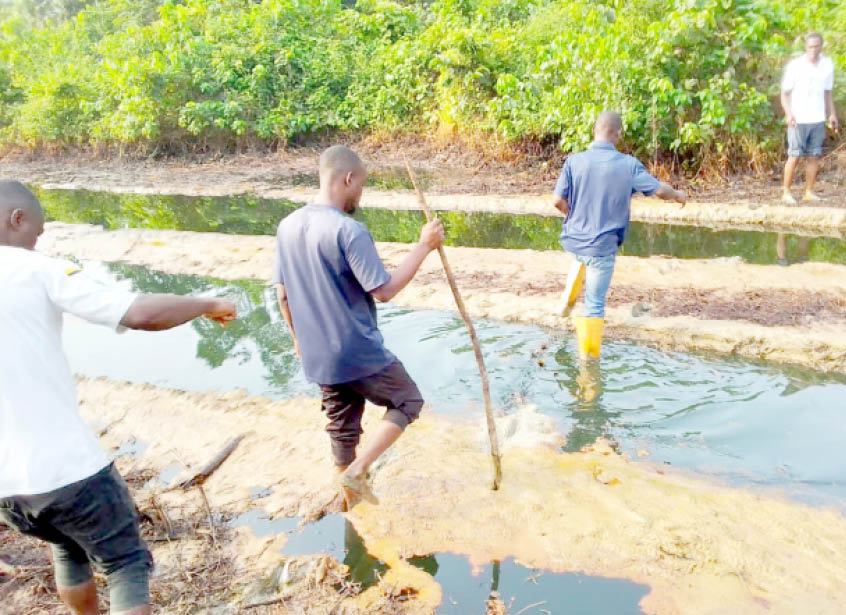
By Chidimma C. Okeke As Ecojustice Africa, tech initiative launched in Nigeria Environmental crimes have continued to rise in Africa following the consistent illegal activities carried out by both nature and the people. The harmful behaviour of the people toward the natural environment and its population is a crime, which has continued to degrade the environment, deplete natural resources, and cause economic hardship to the people.
The United Nations Environment Programme (UNEP) says environmental crimes have emerged as the world’s fourth largest form of organised crime, trailing only drug trafficking, counterfe,iting, and human trafficking. Environmental crime includes illegal hunting and trade in wildlife (poaching), smuggling of Ozone Depleting Substances (ODS), illicit trade of hazardous waste, illegal, unregulated, and unreported fishing, illegal logging and trade in timber among others. Over the years, Africa, a continent blessed with rich biodiversity and natural resources, has continued to lose its natural resources as a result of activities carried out against the environment, thus,the urgent need to step up the fight against wildlife crime and human-induced reduction of species, which have wide-ranging economic, environmental and social impacts.

The Executive Secretary of Green Growth Africa Sustainable Network, an advocate for just and sustainable green transition, Dr Adedoyin Adeleke, pointed out that every year, environmental crimes cost Africa about $195 billion: in context, that is more than 10 times Nigeria’s total budget for 2024. He said if nothing is done to halt this, it may likely double in the next two years. He said for the over 70 per cent of people living in sub-Saharan Africa who depend on forests and woodlands for their food and livelihoods, environmental crimes threaten their food security, jobs and incomes.
Dr Adeleke who spoke at a briefing for pre-unveiling of Ecojustice, a groundbreaking initiative fighting against environmental crimes and violations, in Abuja on Monday, said a quarter of the world’s mammal species, one-fifth of the world’s bird species, and one-sixth of the world’s remaining forests call Africa home. “Sadly, our abundant biodiversity coupled with endemic poverty, weak regulatory frameworks, and low risks of detection and conviction make Africa a prime target for illegal mining, wildlife trafficking, illegal logging, hazardous waste dumping, and other environmental violations,” he said. He said: “These violations are concentrated in remote and marginalised communities, areas often beyond the reach of conventional security, government, and even media.
While these crimes are properly called “crimes against the environment”, in reality, they can be described as “crimes against humanity” given their far-reaching economic and social implications. “These illicit activities not only devastate ecosystems and the lives of millions of Africans dependent on ecosystem services but also fuel corruption, promote money laundering, and weaken the rule of law. As such, developing African economies lose billions in potential revenues and development opportunities, while a small group of criminals reaps the profits – leading to the quandary which in Nigerian parlance may be described as “monkey dey work, baboon dey chop.
” While noting that environmental crimes are most prevalent in remote communities, he said to address it, citizen-led environmental policing presents a promising approach as they enable local residents to monitor, document and report violations – an important first step in combating environmental crimes. An environmentalist, Almami Dampha, said corruption is more “pervasive, transcontinental, systemic, ruthless and done on an industrial scale in the natural resources sector including our forests, fisheries and wildlife and that leveraging on technology is the best bet for Africa. Recalled the UN Secretary General, Antonio Gutiérrez, had said digital technologies can help to turn things around.
“When used responsibly, sustainably and equitably, digital technologies have the potential to revolutionise conservation. But they are a tool in our arsenal, not a silver bullet. We still need concerted efforts by countries, companies, and individuals to help pull the world’s wildlife back from the brink and build a just, sustainable future,” he also stated.
Also, the Minister of Environment, Balarabe Abbas Lawal had said during the World environment day that they must recognise the critical importance of leveraging digital solutions to address the myriad of challenges facing the planet’s ecosystems notably combating illegal wildlife trade, mitigating habitat loss and tackling the impacts of climate change among others. He said by leveraging innovative solutions, they not only amplify their capacity to protect endangered species but also foster greater connectivity between people and the planet they call home. Lawal said the federal ministry of environment has been in the forefront in ensuring the protection and conservation of Nigeria’s rich biodiversity of wild fauna and flora.
Meanwhile, to help fight environmental crime, Green Growth Africa unveiled the EcoJustice Africa, a citizen-driven, tech-enabled initiative designed to combat environmental crimes and empower communities to exercise their “right to a clean, healthy, and sustainable environment”. EcoJustice Africa combines seven solution pillars to stem environmental crimes and promote environmental justice in Africa through citizen empowerment, digital innovation, data verification, stakeholder engagement, evidence-based advocacy, data-driven policy engagement and strategic litigation. The digital innovation, Green Growth Watch, will serve as an eyewitness reporting mobile application that will empower every citizen to become a frontline advocate and eyewitness reporter for environmental justice (EcoAdvocates).
The executive director of the network said the digital solution will enable citizens to capture, document, and report audiovisual evidence of environmental crimes and related events within their localities in real time. “Throughout the entire process, citizen reporters can choose to be anonymous, protecting them from threats, victimisation, or worse. The initiative includes the EcoJustice Fellowship Programme, which leverages our innovative mobile application to train environmental activists as “EcoFellows” for in-country verification of reports and to empower citizens as “EcoAdvocates.
” He maintained that the strategic use of digital technology ensures a wider reach, real-time tracking of environmental crimes and violations, and hences a stronger impact in the fight for environmental justice. Join Daily Trust WhatsApp Community For Quick Access To News and Happenings Around You..















